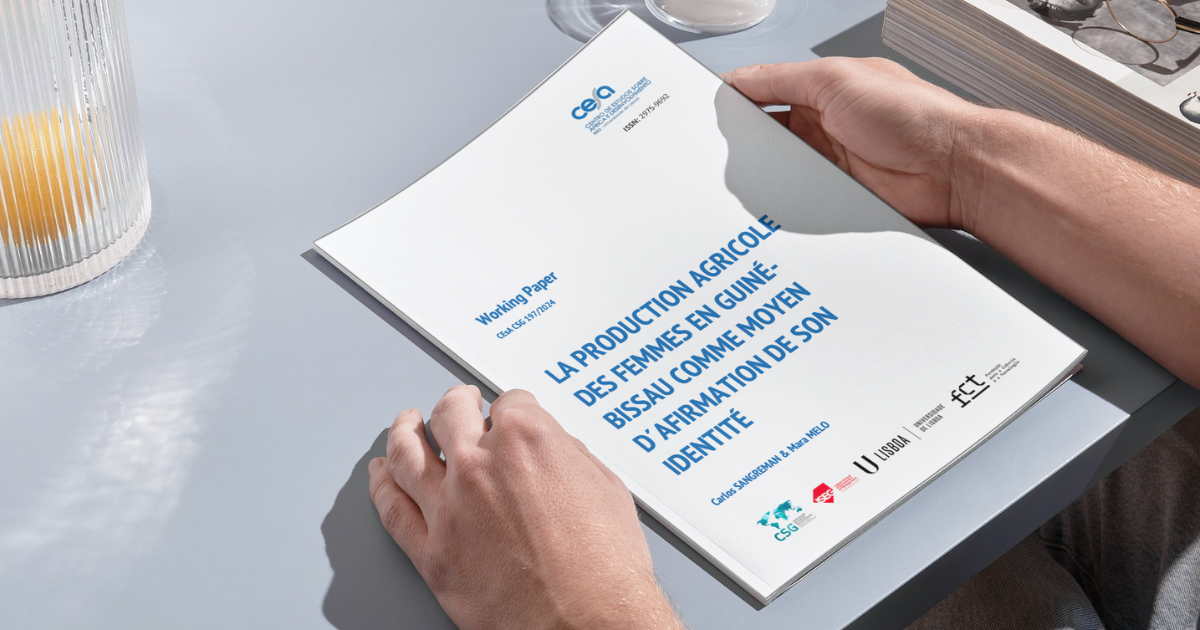CESA

CEsA 40th Anniversary and MDCI 30th Anniversary
Join us in celebrating the 40th Anniversary of the Foundation of CEsA – Centre for African and Development Studies, a reference in Portugal in Development Studies since 1983! At this conference, we will also mark the 30th Anniversary of the creation of ISEG’s Masters in Development and International Cooperation. We will close with the launch of the book “Crónica das Ilhas”, written by José Luís Mascarenhas Monteiro. Register here!
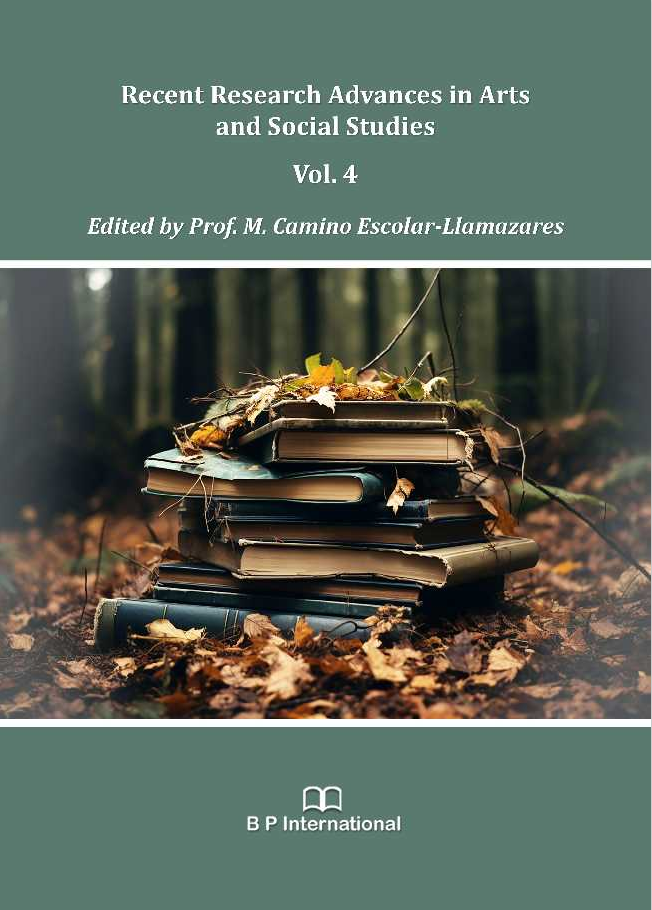
The Values of Portuguese International Development Cooperation: Review and update after 2013
Abstract:
In recent years, International Development Cooperation has assumed particular importance in scientific research and there are currently several studies of general scope or limited to a smaller geographical or thematic space, such as those that focus on national cooperation policies. In general, these works have sought not only to explain its historical, institutional and strategic evolution, but also to constitute a basis for reflection on a long journey of ideas, values and practices that it has been following and its results with partner countries. Portuguese Cooperation is no exception and, in general, all the publications that contextualize it refer directly or indirectly to the general values by which it is governed. However, there aren´t studies that identify the individual reference values of the action of the Cooperation actors in their practice of identifying, managing, and evaluating projects. In this article, we intend to identify the values considered as guiding principles of the action that the actors of the Portuguese Cooperation individually consider in the practices they develop. Such an intention constitutes a real innovation, since the only values identified so far are those that governments include in the strategies presented, more or less inspired by the documents of the European Union (EU) and the Development Assistance Committee (DAC) of the Organization for Economic Co-operation and Development (OECD).
Cite this paper:
Sangreman, Carlos e Raquel Faria (2024). ” The values of Portuguese International Development Cooperation: Review and Update after 2013″. In Recent Research Advances in Arts and Social Studies (Vol. 4), M. Camino Escolar-Llamazares (ed), 148-167. London: B P International
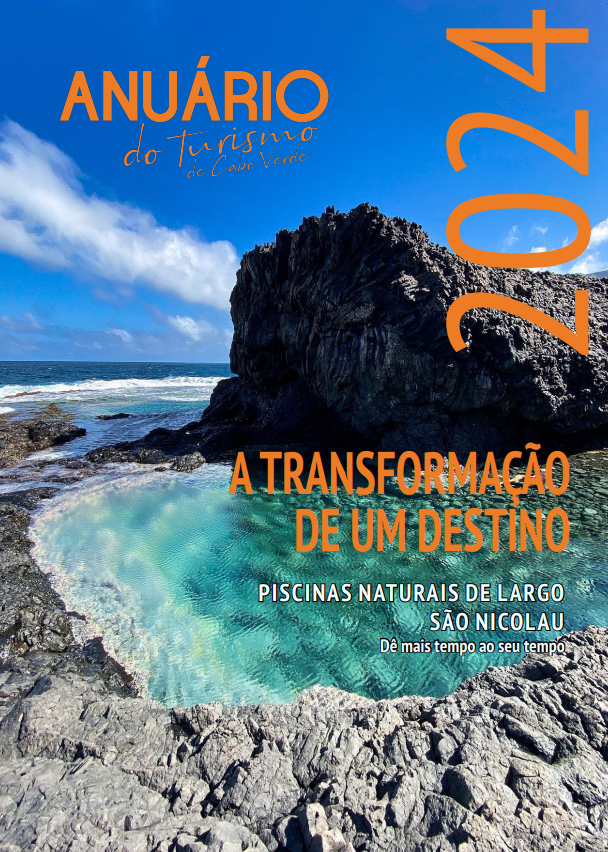
Turismo Costeiro e Marítimo em Cabo Verde. Rumo a um destino sustentável
Cite this paper:
Sarmento, E. (2024). Turismo costeiro e marítimo em Cabo Verde. Rumo a um destino sustentável. In Morgado, Carlos (2024). Anuário do Turismo de Cabo Verde 2024: a transformação de um destino (pp.30-32). Praia, Cabo Verde.
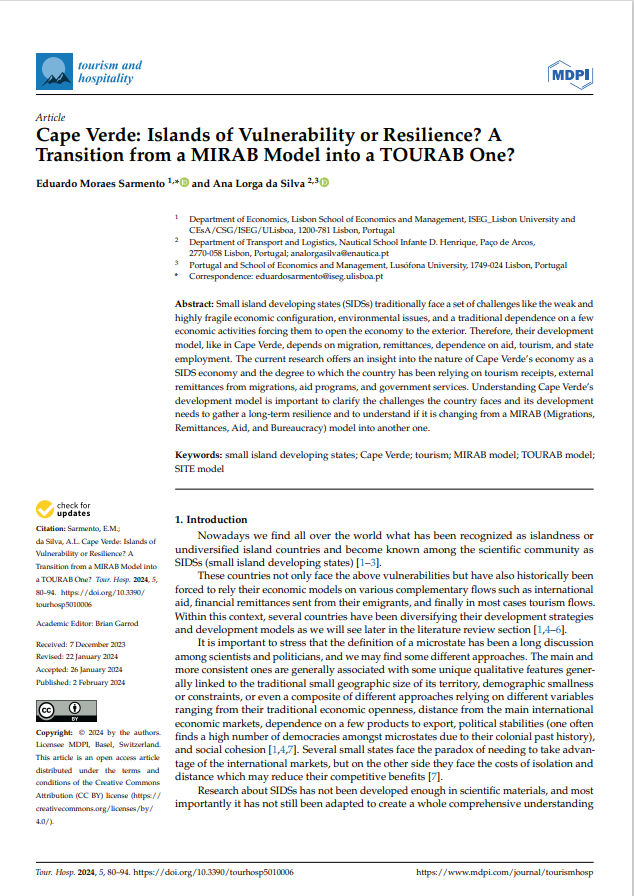
Cape Verde: Islands of vulnerability or resilience? A transition from a MIRAB Model into a TOURAB one?
Abstract:
Small island developing states (SIDSs) traditionally face a set of challenges like the weak and highly fragile economic configuration, environmental issues, and a traditional dependence on a few economic activities forcing them to open the economy to the exterior. Therefore, their development model, like in Cape Verde, depends on migration, remittances, dependence on aid, tourism, and state employment. The current research offers an insight into the nature of Cape Verde’s economy as a SIDS economy and the degree to which the country has been relying on tourism receipts, external remittances from migrations, aid programs, and government services. Understanding Cape Verde’s development model is important to clarify the challenges the country faces and its development needs to gather a long-term resilience and to understand if it is changing from a MIRAB (Migrations, Remittances, Aid, and Bureaucracy) model into another one.
Cite this article:
Sarmento, E.; Silva, Ana (2024). Cape Verde: Islands of Vulnerability or Resilience? A Transition from a MIRAB Model into a TOURAB One? Tour. Hosp. 2024, 5(1), 80-94; https://doi.org/10.3390/tourhosp5010006. MDPI. Special Edition Submit to Special Issue: Small Island Developing Countries (SIDS): Tourism between Innovation and Authenticity for Better Sustainable Developing Paths

Development Studies Seminars 2024 | Capital Markets by Design? The rise of financial development planning in Southeast Asia
The seminars are an initiative that, since 1991, promotes research carried out in the areas of study of MDCI/ISEG/ULisboa and PDED/ISEG/ULisboa.

Development Studies Seminars 2024
Topic: “Capital Markets by Design? The rise of financial development planning in Southeast Asia”
Presenters: Lena Rethel & Luís Pais Bernardo (University of Warwick & CEsA/CSG/ISEG/ULisboa)
Date: March 14, 2024 (Thursday)
Hour: 6 pm to 8 pm (GMT/Lisbon)
Venue: Novo Banco Room, ISEG (Quelhas, Rua do Quelhas 6, 1200-781, Lisbon, Portugal)
Free admission, in person event. We recommend prior registration on EventBrite, but the capacity of the room will be filled in order of arrival.
This event is public and will be recorded and photographed for publication on CEsA’s communication channels. If you do not wish to have your image photographed and/or recorded, please notify the event organizers in advance via email: comunicacao@cesa.iseg.ulisboa.pt
More information and programme: https://cesa.rc.iseg.ulisboa.pt/news/development-studies-seminars-will-kick-off-on-february-29-at-iseg-with-a-series-of-10-sessions-of-presentations-by-guest-researchers/
Author: CEsA Communication (comunicacao@cesa.iseg.ulisboa.pt)
Images: CEsA/Reproduction

Working Paper CEsA no. 198/2024 sheds light on the concept of cumulative causation and its relevance for explaining economic growth trajectories in Sub-Saharan Africa

CEsA has published the Working Paper no 198/2024, entitled “The Relevance of the Concept of Cumulative Causation: Understanding growth trajectories in Sub-Saharan Africa”, in English, authored by Alice Nicole Sindzingre. Professor Sindzingre is a CEsA researcher, Research Associate at the CEPN (Paris-North Economics Centre, University Paris-North, France), and at the LAM Research Centre (‘Africas in the World’, National Centre for Scientific Research/CNRS-SciencesPo-Bordeaux, France).
This Working Paper sheds light on the concept of cumulative causation and its relevance for explaining economic growth trajectories in Sub-Saharan Africa. Firstly, it empirically discusses the possibility of divergence between regions and countries, as well as the related theoretical debates. Secondly, it questions the mainstream explanations of growth trajectories: notably the limitations stemming from the pre-eminence of the conceptual framework of equilibrium, as well as the limitations of modelling in the apprehending of causation and consideration of other social sciences. Then it presents the concept of cumulative causation. Finally, it shows the relevance of this concept for the explanation of growth trajectories via the stylised examples of Sub-Saharan Africa vs. East Asian economies.
Click here to access the Working Paper no 198/2024.
Abstract:
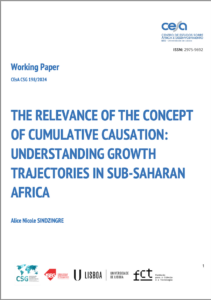 Differences in growth trajectories among countries – including the possibility of divergence –, are a central issue in economics. Mainstream economics explain growth processes via varieties of neoclassical models, even improved with concepts such as institutions. Yet such models have difficulties in providing accurate accounts of the growth trajectories of many developing countries, notably low-income ones. It is argued that the growth paths of low-income countries are more appropriately explained by the theoretical framework that relies on the nexus of concepts of cumulative causation, non-linearities, threshold effects, self-reinforcing processes, irreversibility, path dependence and traps – though this approach remains marginal in mainstream economic analyses of growth and development. Firstly, this nexus of concepts is a powerful framework concerning the possibility and explanation of dynamic divergence regarding growth between countries, as it exhibits properties such as: the possibility of cumulative, dynamically self-reinforcing, processes; the existence of thresholds and tipping points; multiple equilibria. Secondly, cumulative causation, by definition, involves a combination of causes: its conceptual framework allows for the integration of several dimensions – economic, political, social, cognitive –, whose combination results in either virtuous or vicious circles. In developing countries, these causes (and their coalescence) typically consist in economic structures (e.g., commodity-based export markets), political institutions and social norms (predatory regimes, high inequality) as well as types of public policies.
Differences in growth trajectories among countries – including the possibility of divergence –, are a central issue in economics. Mainstream economics explain growth processes via varieties of neoclassical models, even improved with concepts such as institutions. Yet such models have difficulties in providing accurate accounts of the growth trajectories of many developing countries, notably low-income ones. It is argued that the growth paths of low-income countries are more appropriately explained by the theoretical framework that relies on the nexus of concepts of cumulative causation, non-linearities, threshold effects, self-reinforcing processes, irreversibility, path dependence and traps – though this approach remains marginal in mainstream economic analyses of growth and development. Firstly, this nexus of concepts is a powerful framework concerning the possibility and explanation of dynamic divergence regarding growth between countries, as it exhibits properties such as: the possibility of cumulative, dynamically self-reinforcing, processes; the existence of thresholds and tipping points; multiple equilibria. Secondly, cumulative causation, by definition, involves a combination of causes: its conceptual framework allows for the integration of several dimensions – economic, political, social, cognitive –, whose combination results in either virtuous or vicious circles. In developing countries, these causes (and their coalescence) typically consist in economic structures (e.g., commodity-based export markets), political institutions and social norms (predatory regimes, high inequality) as well as types of public policies.
About the author:

Alice Nicole Sindzingre is reseacher at CEsA, and Research Associate at the CEPN (Paris-North Economics Centre, University Paris-North, France), and at the LAM Research Centre (‘Africas in the World’, National Centre for Scientific Research/CNRS-SciencesPo-Bordeaux, France). She taught in 2008-2010 at SciencesPo-Paris and in 2010-2014 in the department of economics of the University Paris-Nanterre. In 2005-2008, she wrote the monthly column on the theories of economic development in the French newspaper Le Monde. She has been a member of the Core Team of the World Bank World Development Report 2000-1 on poverty. She has conducted research on development economics and political economy as well as fieldwork in Sub-Saharan Africa (mainly in West Africa). She has published a great number of articles in academic journals and edited books on a large range of topics, including international trade, regional integration, foreign aid, China-Africa relationships, poverty traps, the theory of institutions, and the epistemology of economics.
Click here and get to know all the Working Paper Collection of CEsA
Author: CEsA Communications (comunicacao@cesa.iseg.ulisboa.pt)
Images: CEsA/Reproduction
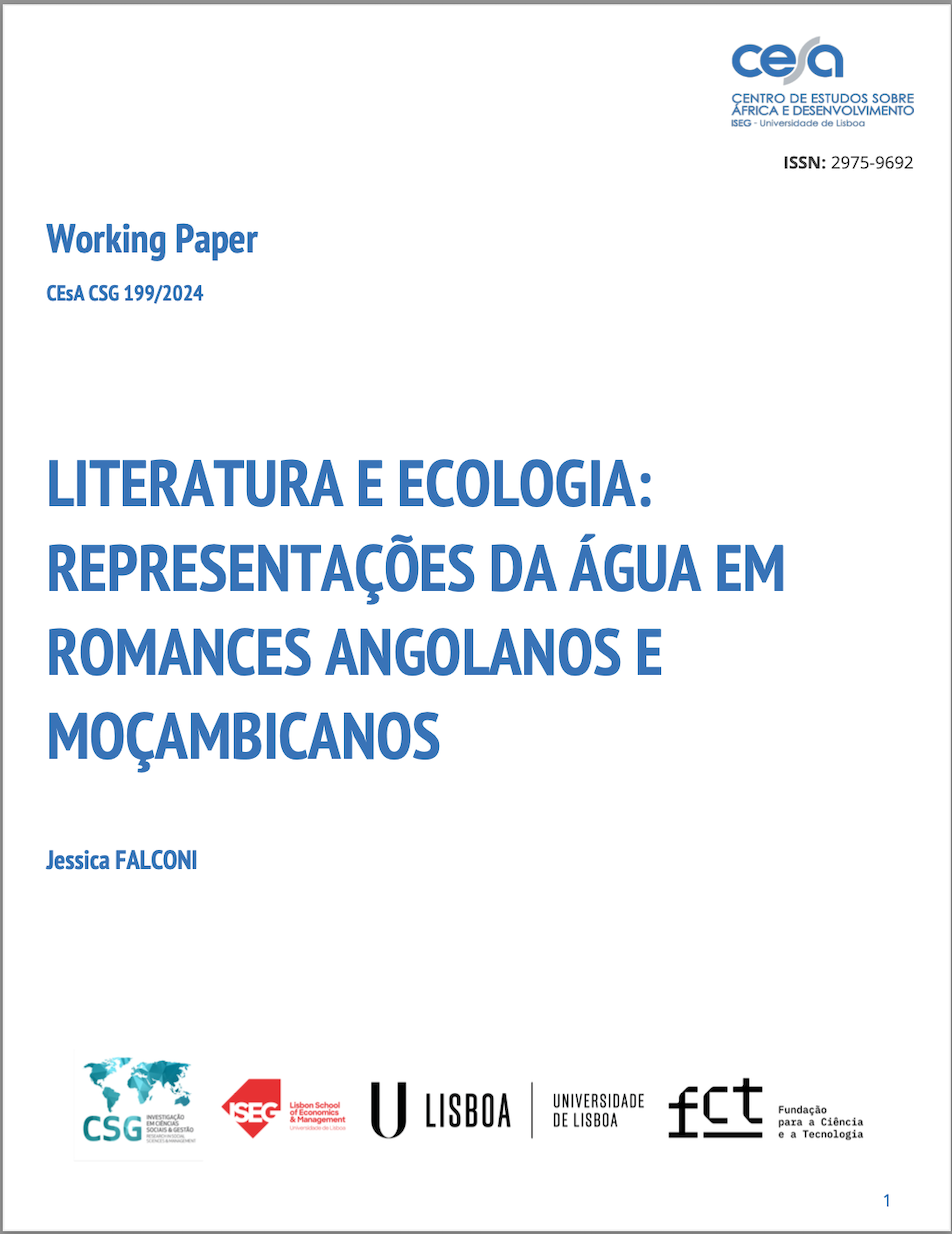
Working Paper 199/2024: Literatura e Ecologia: Representações da água em romances angolanos e moçambicanos
Abstract:
This article offers a brief cartography of the narrative role of water in Angolan and Mozambican literature, through a comparative reading of four novels: O desejo de Kianda (1995) by the Angolan Pepetela; De Rios Velhos e Guerrilheiros. I. O Livro dos Rios (2006) by Luandino Vieira; Água. Uma novela rural (2016) and Ponta Gea (2017) both by the Mozambican João Paulo Borges Coelho.
The introduction places the proposed cartography within the framework of ecocritical studies, whose various paradigms offer useful tools and concepts for reading the selected literary works. The thematic and comparative methodological approach highlights experiences and imaginaries common to two post-colonial contexts, despite the difference in scenarios, themes, aesthetic choices and narrative strategies. The analysis aims to demonstrate that water is a crucial element in narrating post-colonial Angolan and Mozambican societies.
Cite this Working Paper:
Falconi, Jessica (2024). “Literatura e Ecologia: Representações da água em romances angolanos e moçambicanos”. CEsA/CGS – Documentos de trabalho nº 199/2024
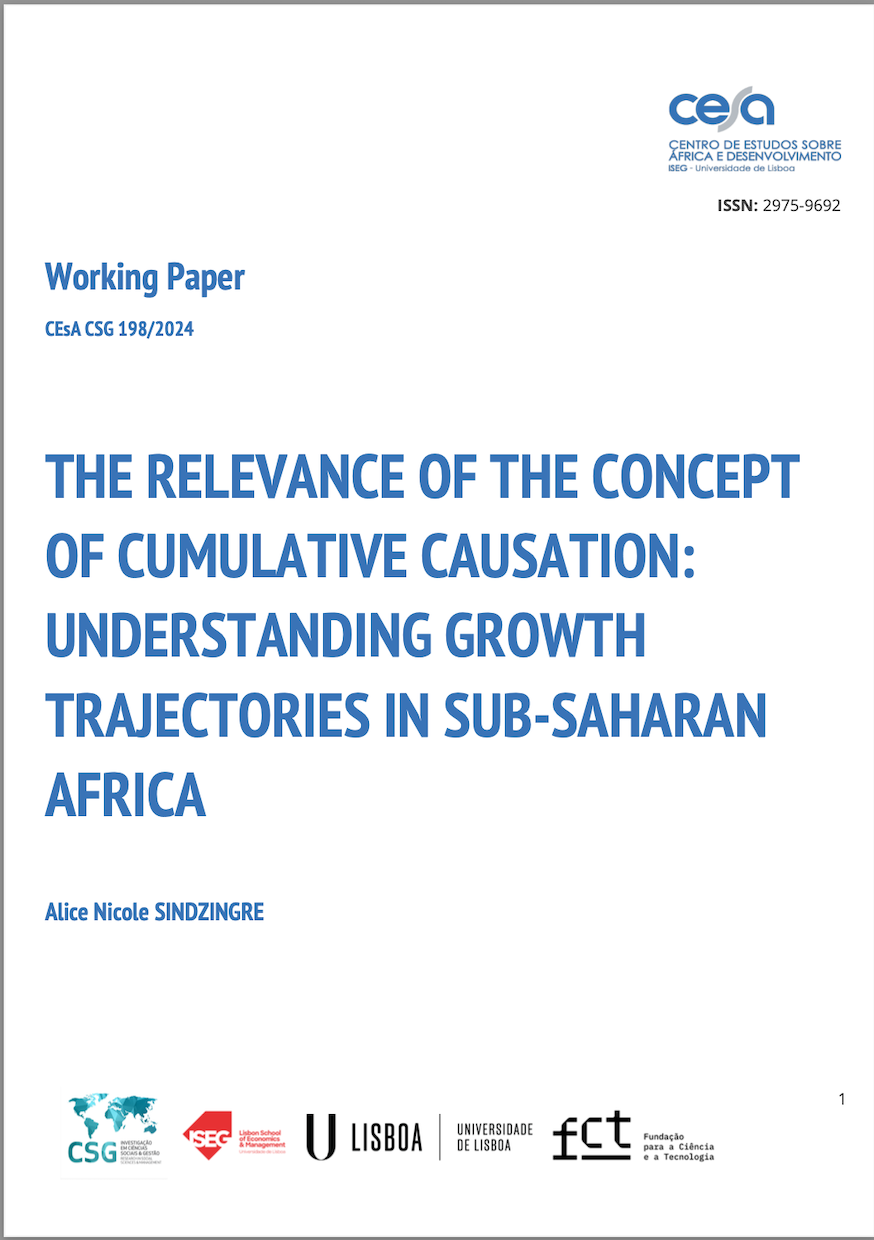
Working Paper 198/2024: The Relevance of the Concept of Cumulative Causation: Understanding growth trajectories in Sub-Saharan Africa
Abstract:
Differences in growth trajectories among countries – including the possibility of divergence -, are a central issue in economics. Mainstream economics explain growth processes via varieties of neoclassical models, even improved with concepts such as institutions. Yet such models have difficulties in providing accurate accounts of the growth trajectories of many developing countries, notably low-income ones. It is argued that the growth paths of low-income countries are more appropriately explained by the theoretical framework that relies on the nexus of concepts of cumulative causation, non-linearities, threshold effects, self-reinforcing processes, irreversibility, path dependence and traps – though this approach remains marginal in mainstream economic analyses of growth and development. Firstly, this nexus of concepts is a powerful framework concerning the possibility and explanation of dynamic divergence regarding growth between countries, as it exhibits properties such as: the possibility of cumulative, dynamically self-reinforcing, processes; the existence of thresholds and tipping points; multiple equilibria. Secondly, cumulative causation, by definition, involves a combination of causes: its conceptual framework allows for the integration of several dimensions – economic, political, social, cognitive -, whose combination results in either virtuous or vicious circles. In developing countries, these causes (and their coalescence) typically consist in economic structures (e.g., commodity-based export markets), political institutions and social norms (predatory regimes, high inequality) as well as types of public policies.
Cite this Working Paper:
Sindzingre, Alice Nicole (2024). “The Relevance of the Concept of Cumulative Causation: Understanding growth trajectories in Sub-Saharan Africa”. CEsA/CGS – Documentos de trabalho nº 198/2024

Development Studies Seminars 2024 | Rice, Institutions, and the Wealth of Nations: The China Puzzle

Development Studies Seminars 2024
Theme: “Rice, Institutions, and the Wealth of Nations: The China Puzzle”
Presenter: Xinpeng Xu (Hong Kong Polytechnic University)
Date: February 29, 2024 (Thursday)
Hour: 6 pm – 8 pm (Lisbon time)
Venue: Novo Banco Room, ISEG (Ed. Quelhas, Rua do Quelhas 6, 1200-781, Lisboa, Portugal)
REGISTER HERE!
Free admission, in person event. We recommend prior registration on EventBrite, but the capacity of the amphitheater will be filled in order of arrival.
The seminars are an initiative that, since 1991, promotes research carried out in the areas of study of MDCI/ISEG/ULisboa and PDED/ISEG/ULisboa.
More information and the complete programme: https://cesa.rc.iseg.ulisboa.pt/news/development-studies-seminars-will-kick-off-on-february-29-at-iseg-with-a-series-of-10-sessions-of-presentations-by-guest-researchers/
Why are some countries so rich while others so poor? I argue that thousands of years of farming practice has independent and long-lasting effect on the wealth of nations today. For the whole world sample, I show that rice farming is negatively associated with economic development, independent of the effects of geography and institution. However, the case of China presents a puzzle. Empirical results using disaggregated county-level data suggest a different pattern. I discuss the potential channels of the long-lasting effect, the China puzzle and implications for China’s long-term growth.
Dr. Xinpeng Xu, Professor of Economics, Faculty of Business (The Hong Kong Polytechnic University, Hong Kong)
Professor Xinpeng XU is Professor of Economics at Faculty of Business, the Hong Kong Polytechnic University, Hong Kong. Professor Xu was Visiting Professor to many leading universities in the world and was invited to give Public Lecture at Peking University in China, Charles University (Czech) and the Jagiellonian University (Poland), among others. He is the recipient of Hong Kong Research Grant Council’s competitive research grants. He received Faculty Prize for Outstanding Performance in Teaching at the Hong Kong Polytechnic University and has many years’ experience in teaching at the level of MBA, EMBA, DBA and Doctor of Management in both Mainland China and Hong Kong. Prof. Xu has published many papers in reputable international refereed journals. Professor Xu served as a consultant to international organizations such as OECD and APEC. He obtained his Ph.D. in Economics from the Australian National University, Australia.
Author: CEsA Communication (comunicacao@cesa.iseg.ulisboa.pt)
Images: CEsA/Reproduction
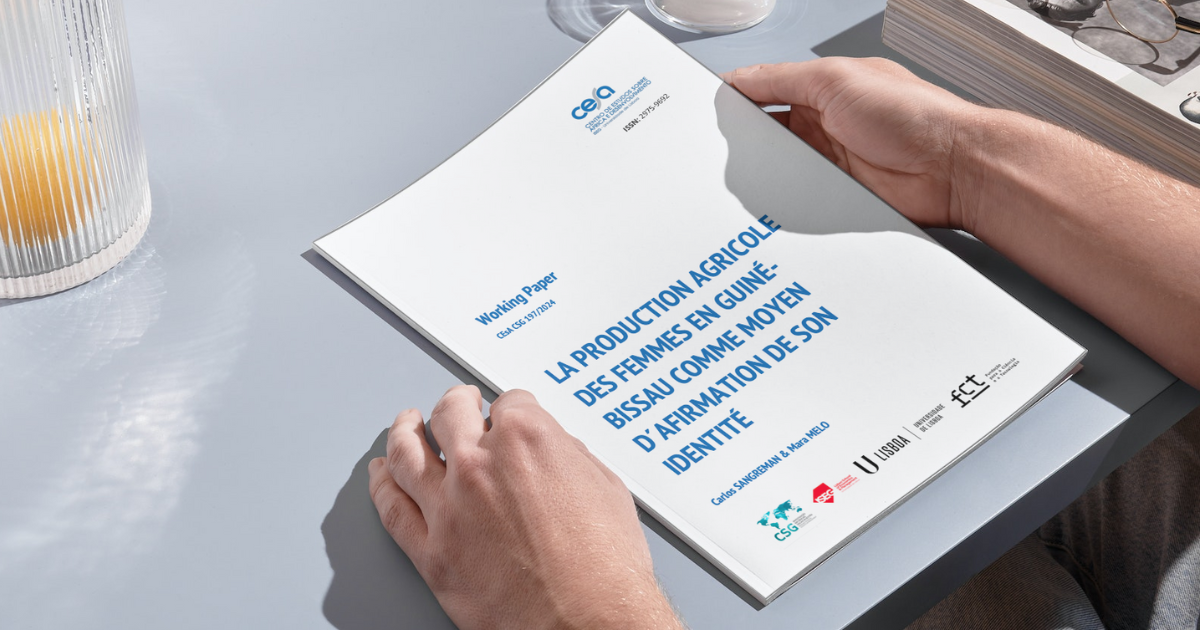
Working Paper CEsA no. 197/2024 analyses the impact of work and income on the identity of women horticulturists in Guinea-Bissau
CEsA has published its firts Working Paper in 2024 (no 197/2024), entitled “La Production Agricole des Femmes en Guiné-Bissau comme Moyen d´Afirmation de son Identité”, in French, authored by Carlos Sangreman and Mara Melo. Sangreman is President of the CEsA Assembly, is a CESA researcher, assistant professor of the Universidade de Aveiro (Portugal), and consultant for Guinea-Bissau at the Institute of Hygiene and Tropical Medicine in Portugal and Casa dos Direitos in Bissau. Melo holds a master’s degree from the University of Coimbra and the Institut d’ Études Polítques de Bordeaux.
This Working Paper is an intermediate product of the study carried out for Swiss Cooperation in Guinea-Bissau. Surveys and interviews were carried out in the regions of Bissau, Biombo, Bafatá and Oio, in the areas of production of leguminous agricultural products, by producers (mostly women). The focus of the analysis is on the practice of horticulture with the income belonging to women: “it influences the economic factor through the production and sales activity, it influences cultural factors because it is the woman who makes the key decisions for the activity and not the man and fights against family discrimination because women take on responsibilities in the family and home that they otherwise would not be able to assume and, therefore, tend to have a greater voice in family decisions”.
Click here to access the Working Paper no 197/2024.
Abstract:
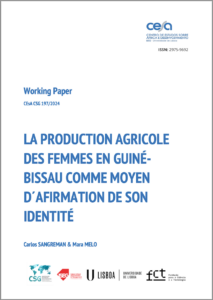 This working paper is an intermediate product of the study done for Swiss Cooperation in Guinea-Bissau, written in French without any point in Portuguese. What we demonstrate, as well as the principles of restitution and appropriation by the persons or institutions that access to respond to surveys or interviews, are words that do not translate into concrete actions for this Cooperation. The data were obtained by surveys and interviews in the regions of Bissau, Biombo, Bafatá, and Oio, with the producers (which also include a limited number of male producers) of leguminous agricultural products, in a sample of 160 people chosen at random. At the option of the promoter, the study focused on the marketing of products and not on production. To better understand the results, it must be said that this business model is not very profitable, but it is an activity that gives a greater independence of women in relation to men in the family space, since decisions about the use of profits belong to the producers. It also has a potential environment of action for the affirmation of the social (and not just family) identity of women that should not be despised although, as far as we can see, this is expressed for now only in the organization of associations of producers.
This working paper is an intermediate product of the study done for Swiss Cooperation in Guinea-Bissau, written in French without any point in Portuguese. What we demonstrate, as well as the principles of restitution and appropriation by the persons or institutions that access to respond to surveys or interviews, are words that do not translate into concrete actions for this Cooperation. The data were obtained by surveys and interviews in the regions of Bissau, Biombo, Bafatá, and Oio, with the producers (which also include a limited number of male producers) of leguminous agricultural products, in a sample of 160 people chosen at random. At the option of the promoter, the study focused on the marketing of products and not on production. To better understand the results, it must be said that this business model is not very profitable, but it is an activity that gives a greater independence of women in relation to men in the family space, since decisions about the use of profits belong to the producers. It also has a potential environment of action for the affirmation of the social (and not just family) identity of women that should not be despised although, as far as we can see, this is expressed for now only in the organization of associations of producers.
Click here and get to know all the Working Paper Collection of CEsA
Author: CEsA Communications (comunicacao@cesa.iseg.ulisboa.pt)
Images: CEsA/Reproduction
